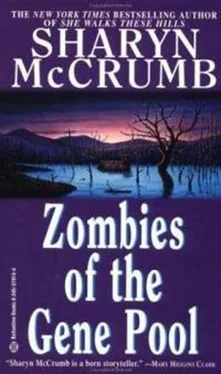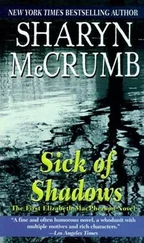Sharyn McCrumb - Zombies of the Gene Pool
Здесь есть возможность читать онлайн «Sharyn McCrumb - Zombies of the Gene Pool» весь текст электронной книги совершенно бесплатно (целиком полную версию без сокращений). В некоторых случаях можно слушать аудио, скачать через торрент в формате fb2 и присутствует краткое содержание. Жанр: Детектив, на английском языке. Описание произведения, (предисловие) а так же отзывы посетителей доступны на портале библиотеки ЛибКат.
- Название:Zombies of the Gene Pool
- Автор:
- Жанр:
- Год:неизвестен
- ISBN:нет данных
- Рейтинг книги:3 / 5. Голосов: 1
-
Избранное:Добавить в избранное
- Отзывы:
-
Ваша оценка:
- 60
- 1
- 2
- 3
- 4
- 5
Zombies of the Gene Pool: краткое содержание, описание и аннотация
Предлагаем к чтению аннотацию, описание, краткое содержание или предисловие (зависит от того, что написал сам автор книги «Zombies of the Gene Pool»). Если вы не нашли необходимую информацию о книге — напишите в комментариях, мы постараемся отыскать её.
Zombies of the Gene Pool — читать онлайн бесплатно полную книгу (весь текст) целиком
Ниже представлен текст книги, разбитый по страницам. Система сохранения места последней прочитанной страницы, позволяет с удобством читать онлайн бесплатно книгу «Zombies of the Gene Pool», без необходимости каждый раз заново искать на чём Вы остановились. Поставьте закладку, и сможете в любой момент перейти на страницу, на которой закончили чтение.
Интервал:
Закладка:
Angela stared at him. "How odd!" she cried. "I've only just realized that we don't know a single thing about the resurrected Pat Malone! We were all so much in shock that no one thought to ask him what he has been doing all these years. We treated him as if he really were a ghost."
"Even if he did come to spoil things, how much trouble could he cause?" asked Marion. "You all are a bunch of writers. How many guilty secrets could you have?" She laughed at her own joke.
Everyone else looked thoughtful.
George Woodard had brushed his teeth, put on his striped pajamas, and cried a few tears of sheer frustration. Now he was ticking off a list of his most sympathetic friends, trying to decide if there was someone he could safely call to discuss the current crisis, but he could think of no one who wouldn't be delighted at the irony and embarrassment of it. George realized that he could crank up the science fiction rumor mill with one phone call, but in doing so, he would not receive one word of consolation or consideration for his plight. It wasn't worth it. Let everybody find out from someone else. He couldn't be bothered.
Earlene was not the first person he thought of to call, but her name did come up in his ruminations. He decided against it. She would probably force a full account of the evening's confrontation from him, and somehow she would contrive to blame George for the fact that it happened at all. Serves you right for going, she would say. No, Earlene would not be pleased that Pat Malone remembered her so clearly. George wasn't pleased, either, of course, but he consoled himself by thinking that it certainly wasn't true.
It had been true thirty-five years ago, but the "hot little number" that Malone recalled had cooled off to glacial proportions several decades back. Now she gave every appearance of being able to fall into a deep sleep as soon as her head hit the pillow. George puzzled over this apparent contradiction in the essence of reality. How could something which was technically true be so utterly false? The polite fiction maintained by everyone else- that Earlene was a dull little housewife-was certainly more accurate, but it ignored a good portion of her life. It was as if Earlene were two people: he had married one, but was forced to live with the other.
For a brief moment, George caught himself wondering if the old Earlene would have continued to exist had she married Pat Malone, but that thought was too damaging to his ego for him to dwell on it for long. He rummaged in his suitcase for the emergency Baby Ruth he had hidden in a sock, and began to quell his anxieties in his customary manner.
In the Holiday Inn in Johnson City, the editors and reporters had taken over the cocktail lounge. They were glad for a chance to get together, although such meetings were far from rare. They just didn't happen in New York. All of the occupants of the lounge worked in Manhattan within a half mile of each other, but in order to socialize, they had to attend conferences in various cities, or turn up as fellow lecturers at a writers' workshop somewhere. If this were a Thursday night in New York, a third of them would be doing their laundry; the other two-thirds would still be at the office.
The fact that Johnson City was a relatively small town did not unduly depress them, because (1) while many of them had fled to New York from small towns, they were well able to tolerate small doses of rural Americana; and (2) the publishing business is a small town.
Although the editors were ostensibly camped in Tennessee to engage in a bidding war, their camaraderie was unaffected by the potential rivalry. They were veterans of many such campaigns, and it was, after all, someone else's money that they were playing with. Except for the possibility of added prestige for a literary coup, which might result in money or perks, the Lanthanides Anthology Auction might as well be a Monopoly tournament. Their attitude toward the other group of professionals present- the various media representatives who had turned up for the occasion-was cordial, but more reserved. They didn't want to seem overly interested in the glitz business, and until one of them owned the current project, they had nothing quotable to say anyhow. Besides, editors secretly fear that journalists have the Great American Novel stashed in typing-paper boxes in their closets, and that given proximity to a book editor, they will try to market it. The editors' dread of becoming a literary hostage- trapped in a corner, listening to an endless plot summary-kept them packed into a tight little herd for protection. They imagined the reporters circling them like lions, seeking to pounce upon the weakest member of the herd.
The journalists in turn kept to their own corner of the lounge, swapping war stories about covering the vice-president, discussing software, and exchanging interesting fax numbers (Billy Joel's, for example). They were equally wary of the editors, who, after all, might want to get their names in the paper or might be seized with a guilt-ridden urge to wave to the folks on TV. Among themselves they also swapped horror stories about the most obnoxious "civilians" who had tried to impose on them lately.
At the beginning of the evening the two factions had staked out opposite sides of the room, holding court around their own tables, with occasional furtive glances toward the other enclave, but as the evening wore on, and sobriety wore out, some of the braver souls began to exchange pleasantries across professional lines, and by midnight, the room had become one large mob of pros, driving less determined tourists to their rooms to contemplate The Best of Carson.
Sarah Ashley, agent for Ruben Mistral and architect of the Lan-thanides package, had hosted a prime-rib dinner for the group earlier in the evening, but she had wisely refrained from discussing business except to say that she for one felt privileged to be present at the making of a science fiction legend. After dinner, she had thanked everyone again for coming to the party and had gone up to her room, leaving the pack to speculate on the next day's events.
They had managed to avoid the subject for a good two hours, but finally weariness with the usual topics prevailed, and an Australian with one of the tabloids called out, "What do you make of this bit of grave robbing that's going on tomorrow?"
"The Dante Gabriel Rossetti syndrome," said Lily Warren, an editor who got her start in publishing with a university press.
"What has baseball got to do with it?" asked the USA Today reporter.
Lily winced. "Rossetti was a nineteenth-century English poet. When his wife died, he buried some of his unpublished work with her, and then about a year later he… went back and dug them up again."
"Geez," said USA Today. "Is anybody buried with the time capsule?"
The tabloid reporter had pulled out his pocket notebook and was already composing his lead.
"I wonder if Sarah Ashley would consider splitting up the package," mused Enzio O'Malley, one of the New York editors.
Lily Warren shook her head. "She'd be crazy to agree to that. Think of the publicity value in the time-capsule anthology story! Every book club in the country will grab it, for starters. Then there's the other sub rights. Films, foreign-"
O'Malley sighed. "I know, but I was thinking in terms of actual literary merit." He ignored the snickering of his colleagues. "You see, we own Brendan Surn's back list, and he really is one of the great writers of the genre." More snickering. "I was thinking that it might be nice to acquire just his story-for a lot less money, of course-and put it in a new anthology of his short fiction."
"No way," said Lily. "The package is too valuable as a whole. Besides-" She hesitated.
"Exactly," said O'Malley. "Selling that piece would gut the whole collection, because Surn's story might be the only thing in there that isn't crap."
Читать дальшеИнтервал:
Закладка:
Похожие книги на «Zombies of the Gene Pool»
Представляем Вашему вниманию похожие книги на «Zombies of the Gene Pool» списком для выбора. Мы отобрали схожую по названию и смыслу литературу в надежде предоставить читателям больше вариантов отыскать новые, интересные, ещё непрочитанные произведения.
Обсуждение, отзывы о книге «Zombies of the Gene Pool» и просто собственные мнения читателей. Оставьте ваши комментарии, напишите, что Вы думаете о произведении, его смысле или главных героях. Укажите что конкретно понравилось, а что нет, и почему Вы так считаете.












